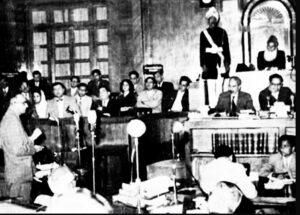29 Gold Medals in MBBS and Still Jobless in Pakistan: Dr. Waleed Malik Breaks The Silence and Exposes the Dark Reality of Pakistan’s Healthcare System

29 Gold Medals in MBBS and Still Jobless in Pakistan Dr. Waleed Malik Breaks The Silence and Exposes the Dark Reality of Pakistan's Healthcare System
Introduction
29 Gold Medals in MBBS and Still Jobless in Pakistan:
In a country where doctors are regarded as the saviors of lives, the story of Dr. Waleed Malik has shocked the nation.
With an impressive accomplishment of earning 29 Gold Medals during his MBBS journey, one would expect a bright and prosperous future for him. However, the harsh reality is far from what we would anticipate.
Dr. Waleed Malik, a highly qualified medical professional, finds himself trapped in the frustrating cycle of unemployment, shedding light on the deep-rooted issues in Pakistan’s healthcare system.
In this blog, we will explore the struggles faced by Dr. Waleed Malik and uncover the systemic challenges that many medical professionals encounter in Pakistan.
The Journey of Dr. Waleed Malik
Dr. Waleed Malik’s journey into medicine was fueled by a passion to serve humanity and bring about positive change in his country’s healthcare sector.
He excelled in his academic pursuits, securing an extraordinary number of Gold Medals during his MBBS years, which caught the attention of many prominent medical institutions across Pakistan.
However, despite his impressive qualifications and exceptional achievements, he faced an unexpected roadblock in his path to becoming a practicing physician.
The Harsh Realities of Pakistan’s Healthcare System
- Oversupply of Doctors: One of the major issues plaguing Pakistan’s healthcare system is the oversupply of doctors. The country produces a large number of medical graduates every year, leading to stiff competition for limited job opportunities.
- Lack of Residency Programs: The absence of an adequate number of residency programs in Pakistan further exacerbates the unemployment crisis among medical graduates. Residency programs are essential for doctors to gain specialized training and practical experience, but the limited availability of these programs hinders career progression.
- Favoritism and Nepotism: The healthcare sector in Pakistan is not immune to the pervasive issue of favoritism and nepotism. Many job opportunities are awarded based on connections rather than merit, leaving qualified candidates like Dr. Waleed Malik at a disadvantage.
- Underfunded Healthcare System: Pakistan’s healthcare system is severely underfunded, leading to a lack of resources, outdated equipment, and inadequate infrastructure in many medical institutions. This impacts the quality of healthcare services and the availability of job opportunities.
The Brain Drain Phenomenon
With limited job prospects in their home country, many highly qualified medical professionals in Pakistan opt to seek employment opportunities abroad.
This phenomenon, known as the brain drain, further depletes the already scarce pool of skilled healthcare workers in the nation, negatively impacting the overall healthcare system.
The Psychological Toll on Dr. Waleed Malik
The emotional toll of unemployment has weighed heavily on Dr. Waleed Malik. Despite his exceptional academic record, he finds himself struggling to secure a stable job, facing feelings of frustration, hopelessness, and uncertainty about his future.
This plight is not unique to him, as many other talented medical graduates face similar struggles.
The Role of Government and Reforms
- The government plays a crucial role in addressing the challenges faced by medical professionals in Pakistan. Policymakers need to develop and implement reforms that focus on the following aspects:
- Strengthening Residency Programs: Increasing the number of residency programs and improving their quality would provide opportunities for young doctors to gain specialized training and experience.
- Addressing the Oversupply Issue: Measures to regulate the production of medical graduates should be taken to balance the supply and demand of healthcare professionals in the country.
- Encouraging Public-Private Partnerships: Collaborations between public and private sectors can help enhance the healthcare infrastructure and create more job opportunities for qualified medical professionals.
- Merit-Based Employment: Implementing a transparent and merit-based system for hiring in the healthcare sector would ensure that deserving candidates are employed based on their qualifications and skills.
Dr. Waleed Malik’s Message and Call for Change
Despite facing numerous setbacks, Dr. Waleed Malik remains determined to make a positive impact on Pakistan’s healthcare system.
His story serves as a wake-up call for the government, institutions, and society as a whole to address the deep-rooted issues in the healthcare sector and provide equal opportunities for talented medical professionals.
Conclusion
The tale of Dr. Waleed Malik is a poignant reminder of the challenges that highly qualified medical professionals encounter in Pakistan’s healthcare system.
The oversupply of doctors, lack of residency programs, and favoritism have created a daunting job market for talented individuals like him. As a nation, Pakistan must take urgent steps to reform the healthcare sector, offering better opportunities and support for its medical graduates.
By doing so, Pakistan can harness the potential of its highly skilled medical workforce, providing quality healthcare services to its citizens and fostering a brighter future for its doctors.
For More Related Articles Browse Our Website Blogster.pk
For social Connection You can also Visit and follow our Social media Platforms
Facebook , Instagram, Linkedin, Pinterest, Quora, Twitter, Youtube.








